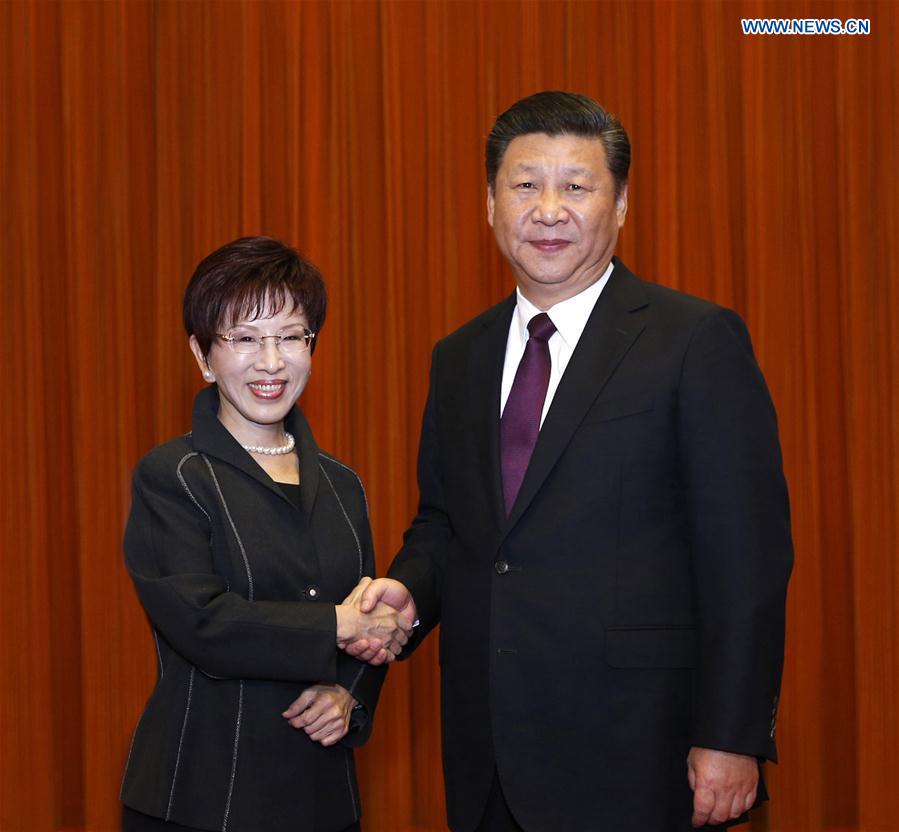

Mainland expects KMT to contain DPP’s independence moves: expert

Xi Jinping (R), general secretary of the Communist Party of China Central Committee, meets with a delegation led by Hung Hsiu-chu, leader of Taiwan's Kuomintang (KMT) Party, at the Great Hall of the People in Beijing, capital of China, Nov. 1, 2016. (Xinhua/Ju Peng)
Leaders of the Communist Party of China (CPC) and the Kuomintang (KMT) met in Beijing Tuesday to mend relations across the Taiwan Straits, which has suffered since a pro-Taiwan independence party took office in May.
Xi Jinping, general secretary of the CPC Central Committee, held a meeting on Tuesday with KMT Chairperson Hung Hsiu-chu, who is on a five-day visit to the Chinese mainland.
During their meeting, Xi stressed the importance of adherence to the 1992 Consensus and called to maintain the peaceful development of cross-Straits relations.
Both parties agree that the 1992 Consensus, which endorses the one-China principle, is vital for cross-Straits communications.
Relations between the Chinese mainland and Taiwan began to suffer after pro-independence DPP leader Tsai Ing-wen assumed the island's leadership in May and has dodged acknowledgement of the consensus.
"To ensure national integrity and protect the fundamental interests of the Chinese nation is the common will of all Chinese people," Xi said during the meeting.
Hung responded by saying that her party, though not in office, will uphold their "mission" to promote "positive energy" across the Straits, and maintain bilateral stability and protect peace and economic development. She also raised the possibility of achieving a peace agreement between the two sides.
"The meeting between Xi and Hung showcased Chinese mainland expectations for a greater role that the Kuomintang party, which carries the advantage of promoting peaceful development across the Straits, can play in Taiwan to contain the DPP," Zhang Wensheng, a research fellow at the Taiwan Research Institute of Xiamen University, told the Global Times.
Considering the KMT party still holds the second-highest number of seats in Taiwan's "Legislative Yuan," "only the party is capable of containing the ruling DPP so far," Zhang said, adding that KMT lawmakers can, for instance, oppose "constitutional" amendments once sensitive topics are tackled.
Hung's visit would also reassure the mainland that only some Taiwan people advocate independence and attempt to seek considerable leeway in future exchanges, Tang Shaocheng, a senior researcher at National Chengchi University in Taiwan told the Global Times.
"It has mended an official channel between the Chinese mainland and Taiwan to consolidate cross-Straits peace," Tang said.
Ma Xiaoguang, State Council Taiwan Affairs Office spokesperson, warned in May that the existing communication mechanisms between the two sides of the Taiwan Straits can only be sustained if Taiwan confirms its acknowledgement of the 1992 Consensus.
Peace agreement
"We [the Kuomintang] will actively play a role in pushing for the institutionalization of peaceful relations between the two sides of the Straits, and explore the possibility of terminating cross-Straits hostility through a peace agreement," Hung said in a speech at the meeting after listening to Xi's speech.
A new policy platform that aims to end cross-Straits hostility through a possible peace treaty was approved by the KMT's national congress in September, the Taipei Times reported.
The ex-presidential candidate also put forward the "one China, same interpretation" framework, which was seen as a further step toward unification, but slammed for being "out of tune" with the KMT by some influential party figures like former "vice president" Wu Den-yih.
"Although the Chinese mainland is open to discussing the possibility of a peace agreement toward the goal of unification, it recognizes the current Taiwan society," Zhang told the Global Times.
The DPP caucus called on Hung on Monday not to cross the "red line" by proposing bilateral agreements with the mainland without government authorization, the Taipei Times reported.
Echoing Zhang, Tang said the visit's significance was deepening mutual understanding of the 1992 Consensus, indicating that Hung lacks first-hand election experience.
On November 7, 2015, former KMT and Taiwan leader Ma Ying-jeou held talks with Xi in Singapore at the historic, first-ever meeting between leaders from across the Taiwan Straits in 66 years.
Ma told Xi that the 1992 Consensus with the one-China principle is the common political foundation for advancing the peaceful development of cross-Straits ties, Xinhua reported.
 Fire brigade in Shanghai holds group wedding
Fire brigade in Shanghai holds group wedding Tourists enjoy ice sculptures in Datan Town, north China
Tourists enjoy ice sculptures in Datan Town, north China Sunset scenery of Dayan Pagoda in Xi'an
Sunset scenery of Dayan Pagoda in Xi'an Tourists have fun at scenic spot in Nanlong Town, NW China
Tourists have fun at scenic spot in Nanlong Town, NW China Harbin attracts tourists by making best use of ice in winter
Harbin attracts tourists by making best use of ice in winter In pics: FIS Alpine Ski Women's World Cup Slalom
In pics: FIS Alpine Ski Women's World Cup Slalom Black-necked cranes rest at reservoir in Lhunzhub County, Lhasa
Black-necked cranes rest at reservoir in Lhunzhub County, Lhasa China's FAST telescope will be available to foreign scientists in April
China's FAST telescope will be available to foreign scientists in April "She power" plays indispensable role in poverty alleviation
"She power" plays indispensable role in poverty alleviation Top 10 world news events of People's Daily in 2020
Top 10 world news events of People's Daily in 2020 Top 10 China news events of People's Daily in 2020
Top 10 China news events of People's Daily in 2020 Top 10 media buzzwords of 2020
Top 10 media buzzwords of 2020 Year-ender:10 major tourism stories of 2020
Year-ender:10 major tourism stories of 2020 No interference in Venezuelan issues
No interference in Venezuelan issues
 Biz prepares for trade spat
Biz prepares for trade spat
 Broadcasting Continent
Broadcasting Continent Australia wins Chinese CEOs as US loses
Australia wins Chinese CEOs as US loses